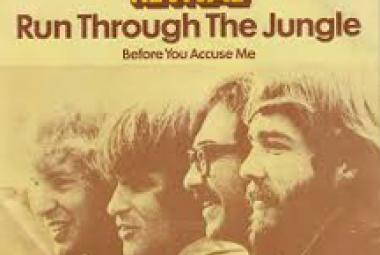Google is an American multinational technology company specializing in Internet-related services and products. These include online advertising technologies, search, cloud computing, and software. Most of its profits are derived from AdWords, an online advertising service that places advertising near the list of search results. Google was founded by Larry Page and Sergey Brin while they were Ph.D. students at Stanford University. Its mission statement from the outset was “to organize the world’s information and make it universally accessible and useful”, and its unofficial slogan was “Don’t be evil”. In 2004, Google moved to its new headquarters in Mountain View, California, nicknamed the Googleplex. (More from Wikipedia)
There are other cool aspects of the CD; the opening track, “Beautiful Wreck” starts with Holly Ramos saying a single word – “sing” – and ends with car-crash sounds. Ramos begins “Ocelot” – a species of wild cat that is also known as the dwarf leopard – with a series of “meow’s”, probably as a counterpoint to the closing line: “Don’t try being something that you’re not.” The word is spelled “oceolot” twice on the CD insert; that might be an alternate spelling, but in any case, “oceolot” gets 122,000 hits on Google.
(June 2013/2)
* * *
Additionally, J. Reuben Silverbird has at least four different websites: an American website (www.silverbird.us/), an Austrian website (www.silverbird.at/), a Norwegian website (www.jsilverbird.no/) – translation of the website is available through Google – and an ordinary “dot-com” website (www.reubensilverbird.com/). The websites have completely different looks, but for the most part, they have similar information.
* * *
Much of the overheated rhetoric about J. Reuben Silverbird is about his name changes; even the minor switch from Ruben to Reuben is mentioned. Using stage names is hardly limited to rock musicians – the very term itself shows that its origin is in the theatre. You needn’t go any further than the drummer for the Beatles to find one: Ringo Starr (born Richard Starkey). Guitarist and songwriter Keith Richards of the Rolling Stones used the name Keith Richard for many years. The John Birch Society called Stones frontman Mick Jagger “Mick Jaeggert” back in the 1970’s; a Google search brought up only two websites using this name – one French and one Hungarian – so this is probably not for real.
(August 2013)
There are actually a lot of websites out there that talk about Blair 1523: It might be surprising to some that a search of the band name in quotes brings up 18,100 hits on Google. The first page of Google hits has a YouTube video of “Fantasy of Folk”, the Bomp! Mailorder site where the “last copies” of the CD can still be purchased plus another listing on Amazon.com, the mention of the band in my Wikipedia article on the Outcasts, the Allmusic review and the Julian Cope blog mentioned above, a listing on last.fm that actually has some information and even a photo of Blair 1523, and more barren listings on mtv.com, Discogs, and Rate Your Music. Further Google pages bring up other barebones listings – the one on Ticketmaster that offers concert tickets and tour schedules for a band that broke up 20 years ago is particularly hilarious – and other places to buy the CD and rate the music and see the lyrics and download “free” MP3’s (Napster lives!).
So how can there be so many Google hits when, on one of these sites, Blair 1523 has a 94.0% rating on the “obscurometer”? Simple: The album exists, and it is easy for web pages to be generated for even unknown albums by websites that pride themselves on knowing about all of the music that is out there. But trying to get a handle on actual information about the band is difficult indeed among all of that dross. That is the reason that Wikipedia typically comes to the top of a Google search.
(September 2013)
* * *
When I first looked up the Liquid Faeries album, Eggshells & Snake Leaves on the Internet, nothing helpful was coming up; so I entered the band name and album name together. Amazingly, I got only about 20 hits on Google – by contrast, I got 18,100 hits for past UARB Blair 1523, and they are plenty obscure as well. I suppose I spelled something wrong, because later on, I had hundreds of hits.
(February 2014)
* * *
At long last, my UARB posts are beginning to come up at high positions on Google searches. A few days ago, I looked for Schattenfreiheit and their album Nachgedanken – they are not officially a UARB, though I talked about them in the post for past UARB Queen Anne’s Lace – and I was thrilled to see my UARB post show up second in the search. Of course, there were only 10 results today for that search (and just 4 the other day). However, just now a Google search for “the Invisible Eyes band” (with no quote marks) generated 17,600,000 results; and my original Facebook post for the band was #2 on that search also. That is truly thrilling for me; Wikipedia entries come up high on a Google search more or less automatically, so I missed seeing high placement on Google for my work.
(December 2014)
* * *
But I was surprised when so many “Crawdaddy” entities came up in the initial Google searches for this post. Make it a search for “Crawdaddys band”, and there is a host of results: Besides the UARB the Crawdaddys, there is a rock band from Australia called the Crawdaddys, a Cajun/zydeco band from Baltimore called the Crawdaddies, a Canadian band called the Crawdaddy’s, a Lynyrd Skynyrd tribute band called Crawdaddy Band, a bluesman from Detroit named Crawdaddy – and that was just on the first page of search results. There are also Crawdaddy’s music clubs all over.
(January 2015/2)
* * *
The years are sure flying by; it seems like I just wrote the article about this Alive Records artist. Normally I talk about new bands in January, but I liked these guys so much that I brought ’em in early. The message of appreciation by Hollis Brown for my picking them as a UARB comes up highest of any of my stuff on a Google search.
(May 2015)
* * *
* * *
I also keep these pieces personally informative; in short, I learn a lot myself from putting these Facebook Notes together. While most of the kernels of what I write about are lodged in my brain somewhere, I coax the details from simple Google searches, with my primary sources being Wikipedia and Allmusic. For the UARB’s and UARA’s, I sometimes find myself mounting searches for hours. I often put in extended quotes that I find on-line, particularly for matters that I don’t know too much about. That is perfectly fine with Wikipedia, but not so much with other Internet source material.
(Year 5 Review)















